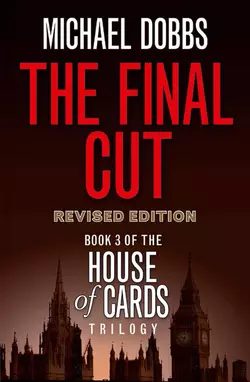The Final Cut

Michael Dobbs
Тип: электронная книга
Жанр: Триллеры
Язык: на английском языке
Стоимость: 766.24 ₽
Статус: В продаже
Издательство: HarperCollins
Дата публикации: 16.04.2024
Отзывы: Пока нет Добавить отзыв
О книге: Francis Urquhart’s eventful career as Prime Minister comes to a spectacular end in the final volume in the Francis Urquhart trilogy – now reissued in a new cover.He schemed his way to power in ‘House of Cards’ and had a memorable battle of wills with the new king in ‘To Play the King’. Now Francis Urquhart is about to take his place in the record books as the longest-serving Prime Minister this century. Yet it seems the public is tiring of him at last, and the movement to force him from power is growing. But Urquhart is not yet ready to be driven from office. If the public demand new blood, that is precisely what he will give them…Francis Urquhart goes out in a blaze of glory in this final volume in the irresistible story of the most memorable politician of the decade.